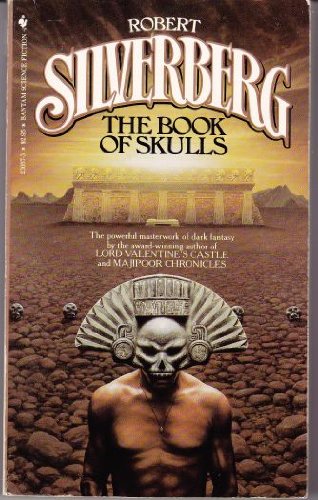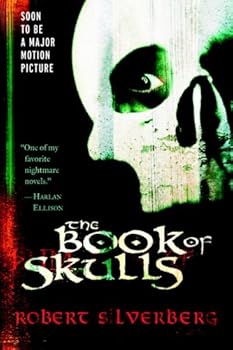
![]() The Book Of Skulls by Robert Silverberg
The Book Of Skulls by Robert Silverberg
Because he has garnered no fewer than eight Hugo and Nebula Awards over the years, has been inducted into the Science Fiction and Fantasy Writers of America Hall of Fame, and has been, since 2005, anyway, an SFWA Grand Master, it might be difficult to credit the notion that Robert Silverberg might also be a writer of horror. And yet, there it is, the 55th book under discussion in Jones & Newman’s excellent overview volume Horror: Another 100 Best Books; namely, The Book of Skulls, which first saw the light of day in 1972, the same year that its author released the masterly Dying Inside. Though its claims for being listed as a sci-fi novel are as debatable as its claims to being labeled horror or fantasy, the book WAS nevertheless nomintated for a Nebula Award in ’72, as was Dying Inside; both ultimately “lost” to Isaac Asimov‘s The Gods Themselves. In ’73, the same two Silverberg books were up for Hugos, again “losing” to the same Asimov novel. (Fortunately, the two writers apparently suffered no hard feelings between them, and went on to collaborate on three books.) However one wishes to categorize The Book of Skulls, however, one thing has become clear to me after a recent reading: It is yet another stunning achievement from Silverberg’s most celebrated writing period.
In the book, the reader encounters four college kids who have decided to spend their Easter vacation in a most unusual manner. We meet Eli, a Jew from New York City who, as a philology student, has unearthed and translated a rare text called The Book of Skulls; Ned, a gay, lapsed Catholic from Boston; Oliver, an Adonis-like farmboy from Kansas; and Timothy, an upper-class WASP from a moneyed Chicago family. Eli’s translation of the rare volume seems to indicate that a monastic sect of some kind, centuries old at least, has the ability to confer immortality to quartets of applicants! And through other unrelated readings, Eli has discovered that just such a sect might actually exist in the desert north of Phoenix, Arizona! So off the four go, on a car trip into the great unknown, all of them with one nagging thought in their minds: The Book of Skulls promises immortality for only two of the four applicants; the third must be killed by the others, and the fourth must sacrifice himself for the greater good. I don’t think I’m spoiling anybody’s fun by revealing that the boys DO ultimately discover the desert sect in Phoenix, and that is when the horrors really begin…
Silverberg’s novel was apparently a great technical challenge for the author because it is presented via four first-person narrators. Each of the boys gets to have his say as the story proceeds, and we are thus able to see things unfold from four different perspectives. It is a most effective way of learning all about our quartet, and by the book’s conclusion all four characters are completely revealed. We not only learn about their reactions to the road trip and their stay with the monastic “fraters,” but – as they meditate on their previous experiences – we discover much about their sexual histories, their hopes for the future and so on. In the book’s most intense section, perhaps, as part of their initiation, each of the boys is compelled to tell one of the others his most embarrassing secret, as a type of psychic purging, and the four revealed tales DO come as a string of shockers to the reader as they simultaneously round the characters out completely. Silverberg’s gambit of employing four alternating narrators here must be deemed a complete success; I cannot imagine an audio version of this book (if there is one) without four separate people providing the voice talent (unless, of course, the publisher can find a genius on the order of a Mel Blanc!). The novel in question gives us a remarkable amount of detail (this is one densely written book), and as usual, Silverberg impresses with his breadth and depth of historical and literary knowledge. Whether referencing explorer John Mandeville, the Uttarakuru and Ugaritic civilizations, the legend of Glaukus the fisherman, or composers Rasoumovsky and Xenakis; quoting poetry from Christopher Marlowe; impressing with his knowledge of the desert Southwest (as he had in his 1967 novel Those Who Watch; Silverberg, it should be remembered, among his 70-odd works of nonfiction, released such works as Home of the Red Man: Indian North America Before Columbus, The Old Ones: Indians of the American Southwest and The Pueblo Revolt); or stumping us with such bits of choice vocabulary as “geniza,” “ithyphallic,” “incipit” and “periphrasis,” he makes the reader aware the he/she is in the hands of an extremely well-read master.
 The book, for all its nightmarish aspects, yet manages to please with occasional glints of humor. Thus, the gay Ned, when contemplating the 10 Commandments, confesses to us that he HAS been guilty of coveting his “neighbor’s ass”; when Ned is compelled by the fraters to have sex with three women in a row as a lesson in self-control (some real fantasizing here by the author!), he tells us that he approached the women with “fraudulent hetero cockiness”! I love it! And speaking of sex, yes, the book IS fairly replete with the subject, as its author continued to revel in his newfound literary freedoms. Thus, all four lads reminisce on their past conquests, and enjoy an orgy of sorts during a stopover in NYC. (The Upper East Side pickup bar scene described early in the novel should resonate fondly with all those who lived through it in the early ’70s.) The author is not above giving us these lines: “Her palpitating body throbbed to his caresses. Her passionate palm rubbed the swollen front of his trousers.” (Silverberg, of course, aside from his immense sci-fi oeuvre, is also the author of some 180 “adult novels,” with such titles as Dial O-R-G-Y, The Lust Plotters, Nympho, Sex Bait and The Gay Girls.)
The book, for all its nightmarish aspects, yet manages to please with occasional glints of humor. Thus, the gay Ned, when contemplating the 10 Commandments, confesses to us that he HAS been guilty of coveting his “neighbor’s ass”; when Ned is compelled by the fraters to have sex with three women in a row as a lesson in self-control (some real fantasizing here by the author!), he tells us that he approached the women with “fraudulent hetero cockiness”! I love it! And speaking of sex, yes, the book IS fairly replete with the subject, as its author continued to revel in his newfound literary freedoms. Thus, all four lads reminisce on their past conquests, and enjoy an orgy of sorts during a stopover in NYC. (The Upper East Side pickup bar scene described early in the novel should resonate fondly with all those who lived through it in the early ’70s.) The author is not above giving us these lines: “Her palpitating body throbbed to his caresses. Her passionate palm rubbed the swollen front of his trousers.” (Silverberg, of course, aside from his immense sci-fi oeuvre, is also the author of some 180 “adult novels,” with such titles as Dial O-R-G-Y, The Lust Plotters, Nympho, Sex Bait and The Gay Girls.)
But at heart, this is a fairly serious novel. As sci-fi author Stephen Baxter tells us in that Jones & Newman volume, it “is an extended meditation on the ultimate horror, the inevitability of personal death in an immense and ancient universe.” Many sections are supremely well-written, bravura exemplars of the writing craft, including Eli’s lengthy put-down of modern-day religion, and Eli’s detailed plans regarding how he will spend his first few hundred years of immortality. In truth, the book is virtually flawless – intelligent, suspenseful, well crafted, gripping (Baxter tells us that he read it in a single sitting) – and I only say “virtually” because of two minor complaints that I have. Namely, Eli being able to rattle off, in retrospect, the names of every dish that the four had eaten in a French restaurant – “quenelles aux huitres, the crepes farcies et roulees, the escalopes de veau a l’estragon,” etc. – though he confesses he had no idea what he was eating. Well, the dude IS a language expert, so I suppose this might be excused. My other quibble: when Eli tells us that he hopes to one day be able to translate the Mohenjo-daro script … although that text had, in actuality, been translated in 1969. (Perhaps the book is supposed to transpire in 1968?) But these, as I say, are quibbles. This really is one remarkable piece of work.
So is it horror or is it science fiction? Well, there ARE skull motifs everywhere in the monastic abode, and things DO turn fairly horrific as events proceed. On the other hand, the fraters claim a line of direct descent from the civilization of Atlantis and are offering immortality, which would argue in favor for a piece of fantasy-laced sci-fi. As Silverberg tells us in his introduction to the 2006 Del Rey edition, it all boils down to whether or not the fraters are legitimate or just a bunch of crazy, desert-dwelling kooks, a point that he leaves somewhat ambiguous by the novel’s haunting and disturbing end. And I do mean “haunting and disturbing”; the mood of this book stayed with me for many days after I finished it, a sure sign of a compelling experience. The book is most assuredly a piece of psychological horror, if anything. Apparently, director William “The Exorcist” Friedkin was all set to turn the book into another of his cinematic shockers back in 2006, but the project, unfortunately, fell through. Personally, I’m not sure how well this deeply, quadrupally personal vision would work theatrically, but there ARE well over 70 other Silverberg pieces of full-length science fiction out there, none of which, amazingly enough, has yet to receive the big-screen treatment.
“The Book of Skulls is a technical tour de force; deeply unsettling, astounding…” Baxter writes in his review, and I for one could not agree more.



Well, we don’t agree on this one. I thought we might not. Like you, I was impressed by Silverberg’s ability to create four distinct narrative voices, each in first person. That still stands out today, so props to him.
I thought the four boys were stereotypical, even down to their “secrets,” and I found this plot predictable from fairly early on. And frankly, in this one, Silverberg’s thinly disguised sexual fantasy-wish fulfillment didn’t do it for me.
Still, it is a good example of psychological horror from a certain period, and I do appreciate his technical expertise.
Wow, Marion, you really ARE a tough audience! LOL!
It’s very true,Sandy.
Ooh, I love it when two of our most respected reviewers disagree on a book! That makes me want to read it more, since all his books from that period are well worth reading.
I see that Book of Skulls, Stochastic Man, and Shadrach in the Furnace are all on Audible, so I may have to fit them next year.
I’M respected? Me? First I’ve heard! Thanks, Stuart! Seriously, though, I really did enjoy this book, and didn’t find it at all predictable or stereotyped. The sex content should not prove as offensive as it was for you in “Up the Line,” either, I have a feeling….
I completely agree that Sandy is respected.